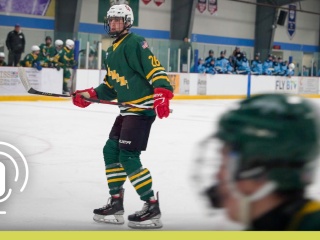Pediatric Urology
Pediatric Urology at Golisano Children's Hospital
A child's urology needs are different from those of an adult. If your child has a condition involving the bladder, kidneys or reproductive organs, it's important to choose a pediatric urology team with specialized expertise.
The pediatric urology team at Golisano Children's Hospital at University of Vermont Health focuses solely on children and adolescents. Our team includes a board-certified pediatric urologist and a nurse practitioner with training and expertise in children's urologic needs. Our nurses and support staff have decades of experience caring for patients as they would their own children.

Why Choose Golisano Children's Hospital?
We treat all pediatric urologic conditions, no matter how rare or complex. Our pediatric specialists throughout UVM Health work together for comprehensive, coordinated care. You can feel confident that you will get answers, advanced treatment options and thorough support.
As one of the region’s leading pediatric urology programs — and home to Vermont’s only children’s hospital — we offer:
- Advanced, effective treatments: We use leading-edge nonsurgical treatments whenever possible. If your child needs surgery, we offer minimally invasive laparoscopic and robot-assisted procedures that allow your child to return to everyday activities quickly.
- A caring staff that understands children: We know how urologic conditions can impact children and teens physically and emotionally. Our caring professionals, including our dedicated Child Life specialists, take extra time to connect with each child and family, helping everyone feel more at ease.
- A collaborative approach to care: In addition to a board-certified pediatric urologist, we assemble a team of pediatric specialists with the expertise matched to your child's needs. If necessary, we can arrange transfer to our affiliate program at Children's Hospital of Philadelphia where your child will receive care in consultation with our team.
- Leadership in pediatric urology: As part of a health system anchored by an academic medical center, our physician-leaders are active researchers, at the forefront of new diagnostic and treatment innovations.
Types of Pediatric Urologic Conditions
Our team treats all conditions affecting the urinary tract and genitalia, including:
- Epididymitis and orchitis: Epididymitis is swelling and pain of the epididymis, a coiled tube behind each testicle in the scrotum. Orchitis is swelling and pain in one or both testicles.
- Hydrocele: A hydrocele is a buildup of watery fluid around one or both testicles. The areas around the scrotum and groin swell, but the condition usually isn’t painful.
- Hypospadias: This condition happens when the urethra (the tube that carries urine from the body) doesn't open at the penis tip. Instead, it opens along the underside of the penis. The penis may bend or curve downward (a condition known as chordee).
- Meatal stenosis: Meatal stenosis happens when the opening to the penis (meatus) narrows. Sometimes the opening can become blocked, leading to discomfort and difficulty emptying the bladder.
- Undescended testicles: While a male fetus develops, his testicles are in his abdomen. Before he is born, the testicles descend into the scrotum (the sac behind the penis). When one testicle does not move into the scrotum as it should, the baby has an undescended testicle.
- Varicocele: A varicocele happens when a vein draining the testicle becomes enlarged, similar to a varicose vein in the leg. Varicoceles may slow the growth of the left testicle during puberty or cause fertility problems.
- Ectopic ureter: Ureters are tubes that drain urine from the kidneys to the bladder. When a ureter drains urine to somewhere other than the bladder, it's called an ectopic ureter. Symptoms include incontinence (bladder control problems), kidney blockage, urinary tract infections (UTIs) and vesicoureteral reflux.
- Kidney stones: Children can form stones in the kidneys. Some stones stay in the kidneys and aren't painful. Others can get stuck in the ureter, blocking urine flow and causing pain.
- Neurogenic bladder: This condition happens when nerve damage prevents the bladder from functioning properly, leading to problems with filling and emptying. Causes include spina bifida, spinal cord trauma or tumors in the central nervous system or pelvis.
- Prenatal or postnatal hydronephrosis: Hydronephrosis occurs when urine backs up into the ureter or kidney of a fetus or infant, causing the kidney to swell. A sign can be a UTI with a fever, or it can be asymptomatic.
- Ureterocele: A ureterocele is a swollen area at the end of the ureter, where urine drains into the bladder. Sometimes ureteroceles can block urine and damage developing kidneys.
- Vesicoureteral reflux: With this condition, urine from the bladder backs up into the ureter. A sign of this condition is a urinary tract infection with fever.
- Labial adhesion: Usually, the labia (the skin folds on either side of the vaginal opening) are separated. A labial adhesion happens when the folds are stuck together, covering the vaginal opening. This condition can cause pain, difficulty urinating, vaginal discharge or UTIs.
- Voiding disorders: These conditions include any unusual urination pattern that occurs after a child has completed toilet training. Voiding disorders include incontinence (daytime or bed wetting), frequent or urgent need to urinate and hesitation to urinate.
- Ambiguous genitalia: Infants with this rare birth defect have external genitals that are not clearly identifiable as male or female.
- Bladder exstrophy: This happens when the abdominal wall doesn’t form properly, leaving the bladder exposed to the outside of the body.
- Epispadias: In boys with epispadias, the urethra opens at the top of the penis instead of the tip. Urethras of girls with epispadias open toward the clitoris or abdomen.
- Kidney tumors: Renal (kidney) tumors in children are rare and usually cancerous. Wilms tumor is the most common renal tumor in children.
Child Life Program
Medical care can be overwhelming for children. Our Child Life Specialists help your child cope with stress, prepare for procedures and understand their care. These highly trained specialists offer your family support as you navigate our health system.

Diagnosing Pediatric Urologic Conditions
We know that children might be apprehensive during urologic testing and exams. Through years of experience caring for children, our compassionate staff knows how to make little ones and their parents as comfortable as possible.
The provider completes a thorough physical examination and asks about your child's personal and family medical history to diagnose your child's condition. If necessary, the provider may request further information and testing, including:
We analyze a urine sample to check for infection, traces of blood or other issues.
In this test, your child voids into a special toilet that records urine flow. In conjunction, we may ask you to maintain a bladder diary, a record of your child’s fluid intake, urinary frequency and urine volume while voiding.
We can take high-resolution images of the urinary tract using various technologies, such as ultrasound, voiding cystourethrogram, MRI or CT scan. If your child needs imaging that uses radiation, we limit exposure as much as possible.
Your provider may order a series of tests to analyze how well your child's bladder stores and releases urine.
Pediatric Urology Treatments
Pediatric urology care plans are as unique as each child. Your child's treatment may include one or more of the following therapies:
Children who have difficulty controlling their bladder may benefit from activities that help train the pelvic muscles, including:
- Voiding on a regular schedule while awake (timed voiding)
- Addressing issues with constipation
- Pelvic floor exercises and biofeedback
Medication can help with symptoms of urologic conditions, such as overactive bladder.
Our team is experienced in all types of urologic surgery for children, including minimally invasive methods. These therapies can result in less pain, a shorter hospital stay and a faster return to your child's favorite activities. Surgical procedures include:
- Endoscopic surgery: The doctor inserts a small tube (cystoscope) with special instruments into a natural opening (such as the urethra) to reach and treat the affected area. This type of surgery usually requires no incisions. Your child’s doctor may use endoscopic surgery for Botox injections or to treat reflux (urine backing up), ureteral stones or kidney stones.
- Laparoscopic surgery: The doctor makes a small incision in the abdomen or pelvis and inserts a tiny camera and instruments to perform surgery.
- Robot-assisted surgery: This type of laparoscopic surgery combines specialized robotic and computer technologies to perform the most delicate procedures.
- Open surgery: This is the traditional type of surgery, in which the doctor makes an incision in the skin and tissue to access the areas of concern. Open pediatric urology surgery is most frequently used for infants.
Locations near you
Share your location to see nearby providers and availability
111 Colchester Avenue
East Pavilion, 4th Floor
Burlington, VT 05401-1473


